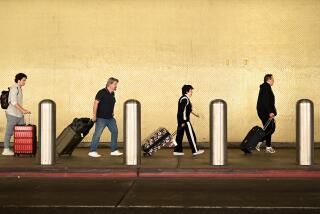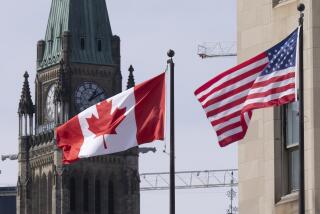Detour Signs Are Posted in Asia
World Travel Watch is a monthly report designed to help you make informed judgments about travel throughout the world. Because conditions can change overnight, always make your own inquiries before you leave home. In the United States, contact the nearest passport agency office; abroad, check in with the nearest American Embassy.
Asia
--Japan: Due to the funeral of Emperor Hirohito, hotel accommodations will be very difficult to obtain Feb. 15-28. Try to complete any travel unrelated to the funeral before Feb. 15, or postpone it until after Feb. 28.
--Pakistan: Travel in rural areas of Sind Province, and in Baluchistan outside the city of Quetta, should be restricted to daylight hours. Foreigners should avoid traveling alone. Daytime road travel between the cities of Hyderabad and Larkana on the west bank of the Indus River should be avoided due to a high incidence of highway robberies.
Special permits are required for travel to the tribal areas bordering Afghanistan. The government maintains only a limited presence in those areas and cannot guarantee the safety of unauthorized travelers. Check with the U.S. consulates in Karachi or Peshawar, or the embassy in Islamabad for the most current information.
Pakistan now has a ski resort, first conceived by a homesick Austrian ambassador in 1962 and finally open 26 years later. The resort of Malam Jabba is at 9,900 feet, a six-hour drive from Islamabad through the Swat Valley.
--Sri Lanka: New President Ranasinghe Premadasa recently ended the state of emergency that has existed since 1984 and released scores of political prisoners who had been held without trial. These steps signal a fresh attempt to resolve the ethnic violence that has wracked the country since the early 1980s. New violence has erupted in the current campaign for parliamentary seats, and will likely continue until the election Feb. 15. Travel with extreme caution and register with the U.S. Embassy on arrival.
--Tibet: The potential for unrest will be high in Lhasa March 5 and 10, when two major anniversaries are marked: March 5 is the first anniversary of the 10,000-strong demonstration against Chinese rule in which 50 people died; March 10 is the 30th anniversary of the uprising that led to the Dalai Lama being driven into exile. Try to plan your trip to avoid Lhasa at that time.
Africa
--Sudan: Possession, sale or consumption of alcoholic beverages is strictly forbidden, and offenders are subject to immediate arrest. Foreigners must register their place of residence with police within three days of arrival, and must notify authorities before moving to another location. All regions of southern Sudan should be avoided because of the continuing civil war.
Mediterranean/Middle East
--Iraq: Although a cease-fire is in effect, tensions remain high between Iran and Iraq, and travel is not recommended to areas north and east of Mosol and along the border with Iran. In addition, travel is occasionally banned north of Mosol. Register with the U.S. Embassy in Baghdad on arrival.
--Turkey: All mountaineers wishing to climb historic Mt. Ararat in eastern Turkey must obtain permits three months in advance and must be accompanied by a licensed guide. Sophisticated video and other equipment must be declared, and travelers must state whether they are going for sport or sightseeing.
Europe
--France: The Louvre Museum will be closed from Feb. 22 until an unspecified date around Easter in preparation for the opening of a new extension.
Oceania
--Australia: A late-summer infestation of mosquitoes carrying Ross River virus is occurring in Perth. The virus creates a high fever that can last for up to two weeks. Best to stay indoors at dawn and dusk when the mosquitoes are most active.
Southeast Asia
--Philippines: Sagada, a picturesque mountain town near Banaue and its famous rice terraces in northern Luzon that has long been a favorite stop for travelers, has recently been caught in the middle of the battle between New People’s Army insurgents and the Philippine army. Townspeople have appealed to both sides to declare Sagada a zone of peace, but to little effect. Travel is not recommended there at this time.
More to Read
Sign up for The Wild
We’ll help you find the best places to hike, bike and run, as well as the perfect silent spots for meditation and yoga.
You may occasionally receive promotional content from the Los Angeles Times.






